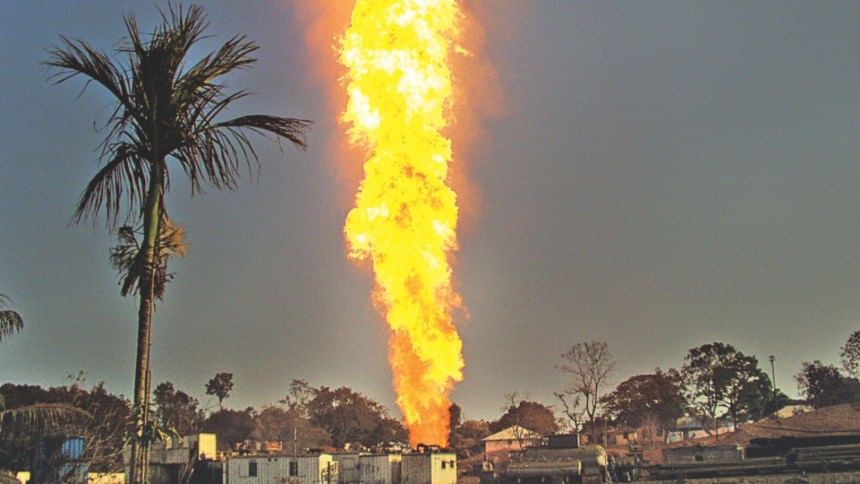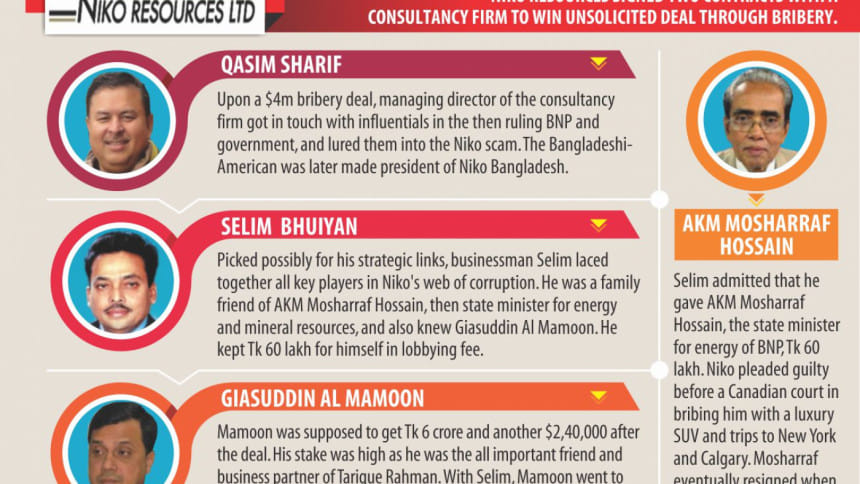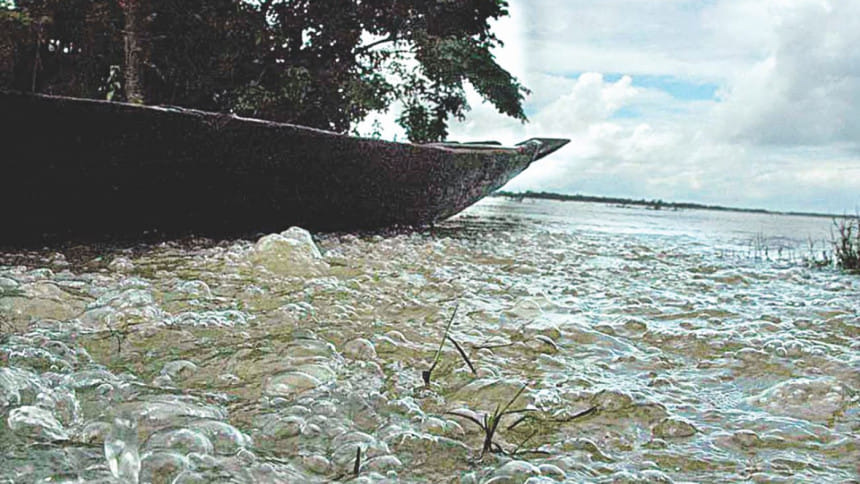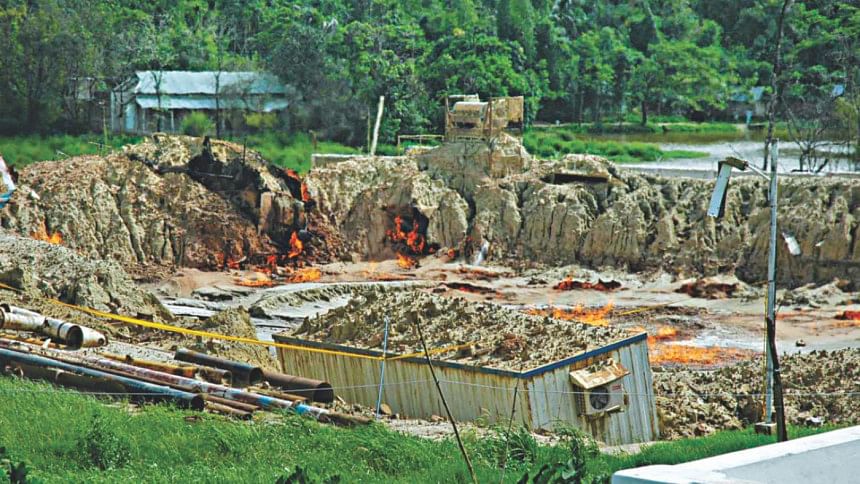NIKO signed bribery deals

Canadian explorer Niko Resources has left behind a hard-to-miss corruption trail, showing how it won an unsolicited energy deal and dodged responsibility for the subsequent blowouts, by bribing influential people linked with the last BNP-led government.
The company, having been floated only in 1987, was so desperate that it did not even hesitate to appoint a consultancy firm, owned by a Bangladeshi-born American, for $4 million to handle the dirty work in Bangladesh, according to evidence obtained by The Daily Star.
Niko went on to sign another contract with the same consultancy firm, Stratum Developments Ltd, partly for disbursing the speed money among government officials. As part of the deal, Stratum would “ensure and expedite” the process of a joint venture agreement (JVA) with local explorer Bapex to develop two gas fields.
Bangladesh, which has been drawn into legal battles at domestic and international courts, submitted the evidence only last year to the World Bank's International Centre for Settlement of Investment Dispute (ICSID), where Niko filed two cases against the Bangladeshi energy custodian Petrobangla and Bapex in efforts to shrug off its responsibility.
Niko's corruption evidence seen by this newspaper include the firm's own admission to bribe the then state minister for energy AKM Mosharraf Hossain to further its business activities in Bangladesh; a cheque showing payment to Giasuddin Al Mamoon, a close friend and business partner of Tarique Rahman; payments to businessman Selim Bhuiyan who had close links with state minister Mosharraf; confessional statements of Selim Bhuiyan; and consultancy and management deals signed between Niko Resources (Bangladesh) Ltd and Stratum.
Lawyers also submitted to the ICSID interviews of Qasim Sharif, managing director of Stratum; Mamoon and some Niko officials, a source with knowledge of the submission said.

Documents also suggest some other BNP government high-ups may have been involved in the scam, but The Daily Star is withholding their names as it has not seen any evidence that proves their involvement.
After the political changeover in 2007, Mamoon and Tarique were arrested and are now facing several criminal cases. Last year, they were convicted in a money-laundering case. Mamoon is in jail while Tarique, senior vice-chairman of the BNP and Khaleda Zia's elder son, now lives in London in some sort of self-exile.
TIMELINE |
|
1997: Niko enters Bangladesh, takes part in second round gas block bidding, but fails October 10, 2001: BNP-led four-party alliance government assumes office |
The Niko case issue has come to the fore as the ICSID of the WB is set to hold the final hearing on April 24-29 of the two cases Niko filed against Bapex and Petrobangla. The proceedings will take place in Paris.
Niko Resources (Bangladesh) filed the lawsuits in 2010 -- one seeking an order clearing it from the liability for the two blowouts in Tengratila in 2005 and the other demanding outstanding payments for the gas it supplied from the Feni gas field to Petrobangla.
THE LONG SAGA
During the tenure of the Awami League government in 1996-2001, Niko tried but failed to get an unsolicited deal. After the BNP-led alliance government took office in 2001, Niko signed the controversial joint venture agreement (JVA) with Bapex to develop two "marginal" gas fields in Chhatak and Feni in 2003.
Marginal gas fields are those that have already been explored, used and then abandoned.
However, Niko later developed a small used gas field in Feni and started selling gas to Petrobangla.
But Niko's first venture to explore a virgin (new or unexplored) gas field in Tengratila of Chhatak led to two blowouts in January and May 2005, causing damage to properties and the environment. The blowouts and the subsequent payments in bribe to settle the issue drew the Canadian company into controversy.
THE CORRUPTION TRAIL
It all goes back to 1997, when Niko entered Bangladesh during the second round Production Sharing Contract bidding for oil and gas exploration. But with just 10 years' experience in the field, the firm failed to qualify in the bid both on technical and financial grounds.
But it continued lobbying to work around the obstacle. In 1998, it submitted an unsolicited proposal for developing the Chhatak and Feni gas fields.
In May next year, the energy ministry decided only used fields may be considered for development. It also decided that instead of an open, competitive bidding, the government will go for a “Swiss Challenge,” where other companies would be asked to submit proposals matching Niko's proposal.
Subsequently in August the same year, Bapex and Niko signed a Framework of Understanding (FoU) to undertake a joint study for identifying used gas fields.
As negotiations over the terms of the Joint Venture Agreement (JVA) were underway during 2000-2001, a top government official allegedly pushed for the deal. But Bapex refused to sign the deal as it found Chhatak field was a virgin (unexplored) field, and not a used one as Niko falsely claimed.
But Stratum was already on the scene to make it all happen. Niko signed a “consultancy agreement” with the firm in July 1999, and renewed it in 2003.
Under the agreement, the Switzerland-based consultancy firm with office in Dhaka would "act on behalf of Niko, to facilitate the approval process in relation to the JVA”.
"The consultant shall be paid a minimum initial consulting fee of $4 million for the company's net share of initial proven reserves within 15 calendar days of execution of the JVA between the Company and Bapex," reads the agreement.
Other fees, which were settled between the parties, were also mentioned in the agreement.
Stratum was headed by Qasim Sharif, who was well known to an influential secretary of the then AL government, worked as an agent for Niko's Bangladesh subsidiary. After the signing of the JVA in October 2003, he became president of Niko's Bangladesh chapter. He now lives in the US.

Niko and Stratum also signed a “management services contract” in October 1999, which was renewed in October 2003, just 15 days before Niko and Bapex singed the JVA.
According to the 2003 contact, "Stratum shall invoice Niko Bangladesh for a retainer fee in the Sum of $20,000 per month effective October 1, 2003. This fee shall cover Stratum's fee in addition to all costs and expenses made or incurred by Stratum such as payments made to expedite or secure the performance by a foreign [Bangladesh] public official of any act of a routine nature that is part of the foreign public official's duties or functions, such as the issuance of permits or licenses required for the [Niko's] Project, the processing of official documents, visas or work permits and the like."
PARTNERS IN CRIME
Government documents show that the JVA deal, signed on October 16, 2003, was vetted by the law ministry and approved by the then prime minister Khaleda Zia.
However, although Niko agreed to a “Swiss Challenge” bidding in 1999, the BNP government did not arrange for such a bidding in 2003. Instead, it went for signing the deal without floating any tender.
Giving the legal opinion in favour of the unsolicited deal, the law ministry said, "The Swiss Challenge method is not applicable for the proposed marginalised gas fields".
Such a bidding method is in conflict with the FoU signed in 1999, argued the then Law Minister Moudud Ahmed in the legal opinion signed on August 25, 2003.
Interestingly, Moudud's law firm "Moudud Ahmed and Associates," which was acting as a legal counsel for Niko, gave similar legal opinions on the issue twice -- on February 27 and August 10, 2003.
According to Niko's documents, the firm made a payment of $6,065 to Moudud on October 12, 2000, and another of $8,315 on January 15, 2002, when he was law minister.
In an interview with Royal Canadian Mounted Police (RCMP), Qasim on December 16, 2010, admitted that Niko did pay Moudud the sum, but it was for the job he did before becoming minister.
The Daily Star tried to reach Moudud by phone yesterday, but he did not pick up the call.
Five days after the JVA was signed, Niko wire-transferred $2.93 million from Niko Canada's First Caribbean International Bank (Barbados) account to a Union Bancaire Privee (Zurich) Swiss bank account of Stratum.

From the sum, Qasim paid $500,000 (around Tk 3 crore) to another company called Nationwide, owned by Selim Bhuiyan, former president of Dhaka Club, who also worked as a Niko agent.
Niko documents show that it paid Selim for his personal influence in arranging meetings with government officials at Bapex, Petrobangla and the energy ministry.
On January 8, 2004, barely three months after the agreement, Selim paid Giasuddin Al Mamoon Tk 1.08 crore through a Standard Chartered Bank pay order (Ref No-CO-60-20040107-0201).
Four years later, Selim admitted before a Dhaka court that he took the money and paid Mamoon.
Mohammad Waliul Islam, a Metropolitan Magistrate of Dhaka, recorded his confessional statement on January 15, 2008.
According to the statement, AKM Mosharraf, who was Selim's family friend for a long time, introduced him to Mamoon sometime in 2001. Then one day in 2002, Mamoon introduced Selim to Qasim.
As the relationship grew, Qasim requested Selim to help them win the Niko deal. Selim agreed, at the same time requesting Qasim to give his organisation a sub-contract once Niko gets the deal.
Qasim also told Selim that he and Mamoon reached an agreement that Mamoon would help Niko get the JVA and GPSA (gas purchase and supply agreement). In return, Niko would give Mamoon Tk 6 crore and an additional $240,000 in three phases, according to Selim's statement.
A week later, Mamoon and Selim went to Mosharraf's house to request him to make the deal happen. After the signing of the JVA, Qasim, as he had promised, deposited $500,000 (Tk 3 crore) into Selim's Standard Chartered Bank account in Gulshan branch in phases.
Of the money, Selim gave Tk 1.8 crore to Mamoon (Tk 1.08 crore through SCB cheque and Tk 72 lakh in cash in phases), Tk 60 lakh to Mosharraf and kept the remaining Tk 60 lakh for himself in lobbying fee.
"Mr Mamoon told me that he was taking the lion's share of the money as Tarique Rahman was with him," Selim, who now lives in Dhaka, said in the confessional statement.
Later in 2012, however, he told The Daily Star that he gave the confessional statement “under duress." He also denied taking money from Niko, but admitted to have travelled to Canada with Mosharraf.
As part of its own investigation, the RCMP questioned Mamoon in jail on November 7-8, 2008, when he admitted to have received the money in return for ensuring the deal.
When the RCMP officials -- Corporal Kevin Duggan and Corporal Lloyd Schoepp -- asked Mamoon about the source of his influence, he said: "My power is fifty percent, I'm the friend of Tarique Rahman.”
MORE BRIBE FOR DAMAGE CONTROL
The first blowout at the Chhatak field in Sunamganj took place on January 8, 2005, just a few days after Niko started drilling.
Under pressure, the government formed a probe committee, which blamed "faulty and negligent operation of Niko for the disaster".
But Niko was quick to act. On May 23, 2005, it presented Mosharraf with a Lexus SUV. Reports of this bribery scheme led to his resignation on June 18.
Meantime, as Niko was drilling a relief well to contain the fire from the first blowout, another blowout occurred at the same field on June 24.
The gas field burned for years, causing a loss of $1.05 billion to Bangladesh.
Alerted by the Canadian Department of Foreign Affairs and International Trade, the RCMP launched an investigation in June 2005.
In June 2011, Niko Canada pleaded guilty before a Canadian court to bribing Mosharraf with the luxury SUV and a trip to New York and Calgary. The company also agreed to pay $9.5 million in fine, which went to the Canadian government fund.
The Alberta Court of Queen's bench in its verdict said, "The fine reflects that Niko Canada made these payments in order to persuade the Bangladeshi energy minister to exercise his influence to ensure that Niko was able to secure a gas purchase and sales agreement acceptable to Niko, as well as to ensure the company was dealt with fairly in relation to claims for compensation for the blowouts, which represented potentially very large amounts of money."
Although the gas purchase and supply agreement (GPSA) was signed in December 2006, Mosharraf allegedly forced Petrobangla to start buying gas from the Feni field from November 2004 when the gas price was yet to be fixed. Petrobangla was also forced to deposit $4 million to Niko's account. Under the agreement, all payments should have been made to a joint account held by Niko and Bapex.
SERIES OF CASES
Over the years, nearly a dozen cases have been filed against high-profile people in local and international courts over the graft scandal, making it a much-talked about issue in Bangladesh.
Niko faced the first legal challenges after the blowouts in 2005, when 10 organisations, including Bangladesh Environmental Lawyers Association, filed a writ petition challenging the validity of the JVA.
The verdict on the petition came after the Awami League took office in 2009. In its order, the High Court asked the government not to pay Niko any money until it pays compensation for the blowouts. Following the order, Petrobangla stopped paying Niko for the gas it purchased.
Earlier in 2008, the caretaker government filed a damage suit with a Dhaka court against Niko, claiming Tk 746.5 crore in compensation for the destruction of properties and gas reserves in and around the Chhatak gas field. The case is now pending.
Also during the caretaker government tenure, the Anti-Corruption Commission filed two cases against Sheikh Hasina and Khaleda Zia over the bribery scam. The case against Hasina was quashed in 2010, a year after she took office. The case against Khaleda, Moudud, Mosharraf, Mamoon, Qasim and Selim as well as five officials of the BNP government is under trial.
For its part, Niko filed two cases with the ICSID.
In September 2014, the tribunal gave its first decision in favour of Niko in the case over the outstanding payments, with insiders alleging Bangladesh's legal battle was timid.
The tribunal said, “Petrobangla owes Niko $2,53,12,747 plus BDT 13,99,88,337 as per Niko's invoices for gas delivered from November 2004 to April 2010.”
In its order in October the same year over the arbitration involving the blowouts, the ICSID noted the issue was technical and complex. And so it “does not wish to proceed in the absence of a critical review of the technical issues,” and appointed its own experts to proceed with a review of the relevant technical issues.
After that procedural order, Bapex and Petrobangla changed their counsel and appointed a law firm, Foley Hoag of Washington DC, in July 2015.
Meantime in March and November last year and February this year, Bapex and Petrobangla produced evidence of Niko's alleged corruption. The tribunal then stayed both the cases Niko had filed and agreed to proceed with a hearing on just the corruption issue.
The evidence was collected by the Anti-Corruption Commission, the RCMP and the Federal Bureau of Investigation.
Talking to these correspondents, Bapex and Petrobangla lawyers said they would argue before the ICSID that Niko resorted to corruption to win the deals in the first place and so its claims for payments must not be entertained.
A Bapex official said Niko stopped operation in Chhatak and Feni gas fields following the blowouts and the subsequent lawsuits. It, however, is working in partnership with a gas company in a gas field in Comilla.
The Daily Star could not contact any of its officials.
Asked by phone, its local counsel Barrister Rokanuddin Mahmud said, "They are my clients. I can't talk to you about any of their businesses or agreement. I have legal professional relationship and I am not required to speak about my client. I can't answer any of your questions."
Asked about the evidence against him, AKM Mosharraf yesterday flatly denied it all: He did not take any car from Niko nor did he travel to the US and Canada with Niko's money.
He also denied receiving any money from Selim, terming the latter's confession “false”.


 For all latest news, follow The Daily Star's Google News channel.
For all latest news, follow The Daily Star's Google News channel. 



Comments